China girl went to Africa at her own expense in January to expose Nigerian pangolin trade.
The Beijing News (Reporter Li Yukun) On April 10th, Singapore intercepted the second batch of pangolin scales in less than a week. These scales weighed 12.7 tons and came from about 21,000 pangolins. Not long ago, China’s customs announced ten typical cases of cracking down on the smuggling of endangered species such as ivory and their products, and many endangered animals and products involved were also from Nigeria.
On March 14th, a China girl with an alias of "African Xia" went to Nigeria, Africa for one month at her own expense, exposing the pangolin trade in the local market, in which the Chinese played a disgraceful role.
As an animal protection organization, China Green Hair Association is also concerned about the smuggling of pangolins from Nigeria, and has written to relevant parties in Nigeria to promote the protection of pangolins. The reporter learned from the China Green Hair Association that the Nigerian Ministry of Environment has replied to the China Green Hair Association and invited the China Green Hair Association to Nigeria from May 20th to 22nd to discuss the protection and cooperation of pangolin endangered species.
Two species of pangolins are distributed in Nigeria.
At one time, Chinese pangolins could be seen shuttling through bamboo forests in southern China, looking for nests of ants or termites. However, the number of Chinese pangolin, regarded as medicine and food, has dropped sharply since the 1960s, and it became "commercially extinct" around 1995.
There are 8 kinds of pangolins in the world, besides Chinese pangolins, Indian pangolins, Malay pangolins and Philippine pangolins are distributed in Asia. There are four pangolin species in Africa, namely black-bellied long-tailed pangolin, white-bellied long-tailed pangolin, big pangolin and South African pangolin.
There are two main species in Nigeria. Pangolin with black belly and long tail is distributed in the southeast of Nigeria. They grow in primary and secondary rainforests, artificial forests (bushes), swamp forests and farmland. The white-bellied long-tailed pangolin mainly inhabits the lowland tropical humid forest in Nigeria, the forest-savanna alternate zone, and in areas where hunting is not carried out, and may also live in cultivated land and fallow land.
According to the investigation, two kinds of pangolins, black-bellied pangolins and white-bellied pangolins, were arrested in Nigeria for consumption or trading in the market, and their scales were used as medicine, including traditional African western medicine, and their numbers were declining continuously.
Locals don’t eat pangolins.
The videos and photos provided by "African Xia" show that it is common for local people to sell pangolins, and it is easy for Chinese people to buy pangolins locally.
The number of Chinese in the local area is quite large, exceeding 200,000. After going there, "African Xia" found that Chinese can be seen anytime and anywhere on the street or in shopping malls and supermarkets.
The local beliefs are mainly Christianity, Islam and Muslims, and they eat fish, chicken, beef and mutton, but there is little demand for pork and wild animals. Many people who sell pangolins told "African Xia" that most of the pangolins they caught were sold to Chinese because local people don’t eat pangolins. Nigeria is still relatively poor, and Chinese are a relatively rich group in the local area.
Although the local virgin forest is decreasing with the increase of human activities, the investigation of "African Xia" found that the local trafficked live pangolins were all arrested in the local forest area. The local temperature is relatively high, reaching 36℃, 37℃ or even higher. If it is shipped from other places, it will die, because pangolins are not resistant to high temperature.
Selling in Chinese, a catty of pangolin scales is only sold in 95 yuan.
The first wildlife market that "African Xia" went to was in Lagos, and its Chinese name was "Little Fishing Village". "I will never forget this market, and I am also very frightened and surprised. I can only think of what I can’t see."
"The small fishing village is far away from where I live, and it was already afternoon when I came here. When my car didn’t stop, the locals came around and said in less fluent Chinese, do you want to buy pangolins? " African Xia said that because it was afternoon, the live pangolins were sold out that day. "There are locals in the market who ask me if I want to buy pangolin scales, and there is a skinned pangolin tail to sell to me."
Besides pangolins, this market also sells other wild animals. She saw bustard, lizard, turtle and python on the chopping board.
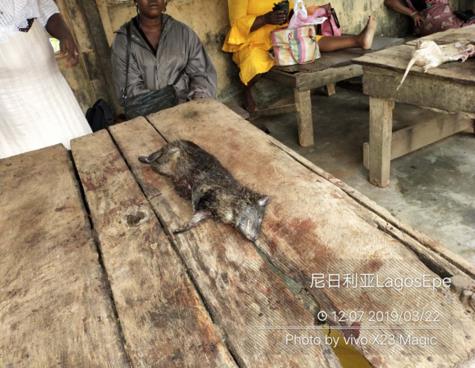
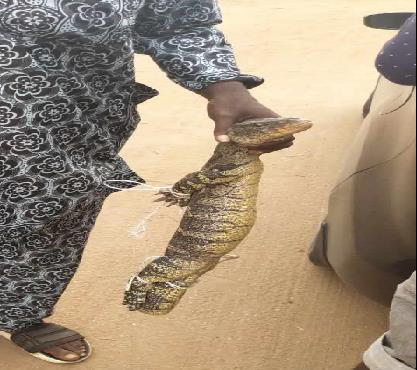
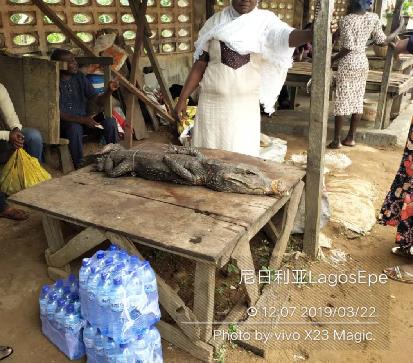
Wild animals sold in the small fishing village market.
Later, "African Xia" went to a small fishing village market early. It was a Monday, and the locals told her that if she had come yesterday, she would have bought a lot. "This market is dominated by Sundays, because Chinese people work from Monday to Friday and will come to this market to buy pangolins on Sundays. The locals told me that he sold five on Sunday. "
In a video displayed by the African Xia, the local people sold her a live pangolin in fluent Chinese, and said that "as much as you want", the price was "18,000, 16,000 naira, and as many as 15,000 naira".
"This person will also sell me pangolin scales, which can provide me with 200 kilograms to 500 kilograms every month. The price is very cheap, 10,000 naira a kilogram, equivalent to about RMB 190 yuan." The African man said.
Plus Chinese WeChat promotion, it can be delivered to your door
"African Xia" later came to the Moroccan market, which is a relatively large local vegetable market and also sells pangolins.
"When I went to this market, a local young man took the initiative to tell me if you want to buy pangolins. And take the initiative to add me to WeChat. I added him to WeChat, and he sent me pictures. " "African Xia" said that after she returned to China, the young man would send her pictures when he caught pangolin, showing reporters the circle of friends and chat records of the local guy.

The local WeChat circle of friends shows the pangolins to be sold.

Local people sell pangolins to her through WeChat.
"African Xia" said with remorse that she made a mistake in this market and failed to save two pangolins.
"This young man showed me pictures and said that there are two pangolins today. Do you want them? Can be delivered to your door, a 15 thousand naira. My heart melted. I think if I don’t buy these two pangolins, they will also become someone else’s food. If I buy them, these two pangolins will still live. In fact, I made a low-level mistake. When he delivered it, the pangolin was already dying. Because it’s late, I want to release it tomorrow morning, but before dawn, these two pangolins are dead.
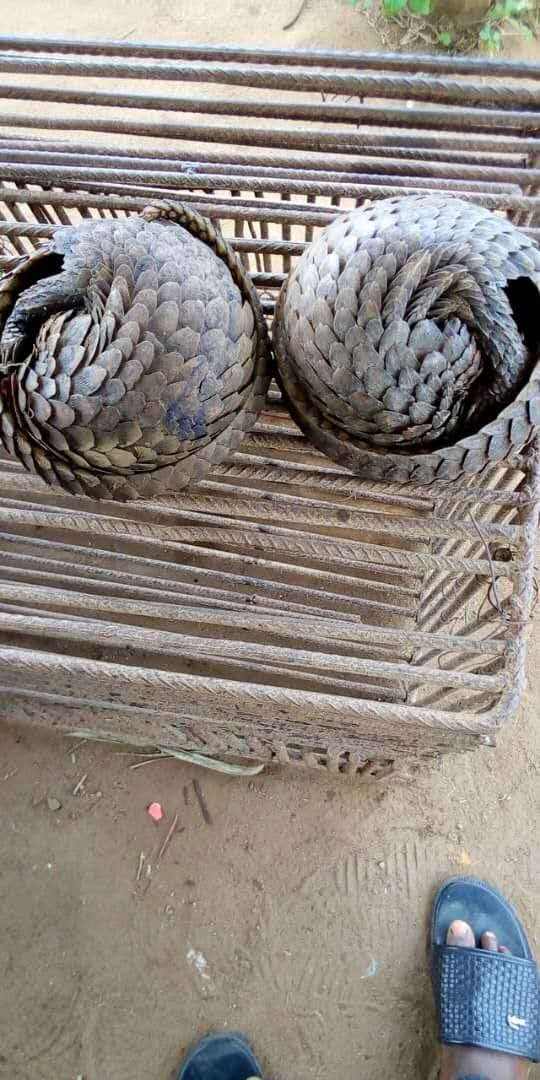
The captured pangolin released by the local WeChat circle of friends.
"I this makes me very sad, I failed to save them, but become a part of the trafficking chain, I think I made a mistake. I hope others don’t make mistakes like mine. " "African Xia" said.
Nigeria’s crackdown
In Nigeria, pangolin is actually protected by the highest law.
On September 29th, 2016, at the 17th Convention on International Trade in Endangered Species of Wild Fauna and Flora (CITES COP 17) held in Johannesburg, South Africa, the proposal to upgrade all eight pangolins from CITES Appendix II to Appendix I was passed. Pangolin enjoys the highest protection under this convention. Nigeria signed and ratified the Convention on International Trade in Endangered Species of Wild Fauna and Flora (CITES). In the same year, Nigeria promulgated the Endangered Species Act, which listed pangolin as an endangered species in Appendix 1.
Statistics in 2018 show that Nigeria has seized 14,833 tons of pangolin and its scales, worth about 900 million US dollars. According to the General Administration of Customs of Nigeria, the amount of pangolin seized in Nigeria ranks first in the world.
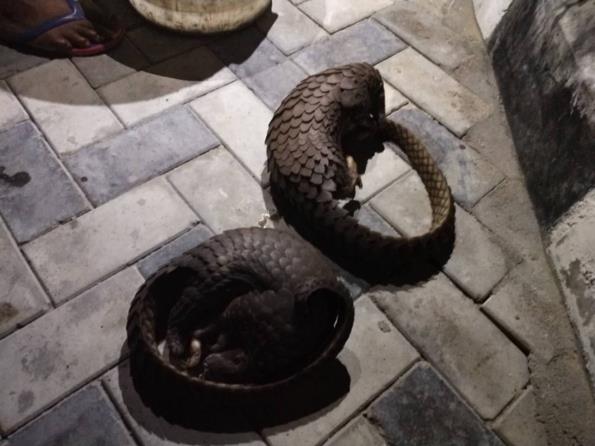
Pangolin sold in the game market in Nigeria.
For example, only on March 15th last year, pangolin scales were sold in Ikaijia, Nigeria. 329 bags of pangolin scales weighing 8.4 tons and worth 1.72 billion naira (about RMB 33 million) were found in an apartment in Chinese.
As an animal protection organization, China Green Hair Association is also concerned about the smuggling of pangolins from Nigeria, and has written to relevant parties in Nigeria to promote the protection of pangolins. The reporter learned from the China Green Hair Association that the Nigerian Ministry of Environment has replied to the China Green Hair Association and invited the China Green Hair Association to Nigeria from May 20th to 22nd to discuss the protection and cooperation of pangolin endangered species.
Huge profits have attracted a lot of smuggling.
According to the investigation of "African Xia", the local price of pangolin in Nigeria is about one in 300 yuan, and the pangolin scales in 190 yuan are a kilo (10,000 naira), that is, a kilo in 95 yuan, which is very cheap. In Guangxi, China, at the beginning of 2017, some people openly peddled pangolins on the Internet, with a living body of "1,500 yuan a catty".
The huge price difference has attracted many smuggling operations.
Since the beginning of this year, many smuggling cases of pangolin have been cracked by customs in many countries. Apart from the pangolin intercepted by Singapore Customs mentioned at the beginning of the article, on February 1 this year, Hong Kong Customs and Mainland Customs took a joint action to crack down on cross-border smuggling of endangered species, and seized about 8,300 kilograms of pangolin scales in a container in the inspection yard of Kwai Chung Customs Building, which was the largest smuggling case ever cracked by Hong Kong Customs. The container was from Nigeria.
Nigerian officials previously said that pangolins were not captured in Nigeria, and Nigeria was regarded as a transit point for illegally smuggling pangolins and their products. However, according to the information obtained from the investigation of "African Xia", there are indeed activities of catching and selling pangolins in Nigeria, "200 to 500 kilograms of pangolin scales can be provided in one month".
In addition, some pangolins in Nigeria may come from neighboring Cameroon. The investigation results in recent years show that pangolins scales mainly come from southern and eastern Cameroon, and some illegal smugglers have been trafficking pangolins and their products for a long time, mainly supplying the Nigerian market. Statistics on February 22 this year show that Cameroon has seized 20,000 tons of pangolin scales in less than five years.
Some people eat pangolin because it is too expensive in China.
"African Xia" said that she had asked more than 20 people in Nigeria and they all asked the same question: Is pangolin really delicious?
"Their answer is not delicious. Pangolin has a taste that can’t be removed. But why eat it? Some people say that it can improve immunity and prevent malaria, others say that it is anti-cancer, others say that it treats skin diseases and prolactin, and it is said that this thing is aphrodisiac, and men are stronger when they eat it. " "African Xia" said that there are still a few people who said that there are almost no pangolins in China. It’s too expensive in China, and it’s so cheap here, so why not eat them.
She feels that in Nigeria, people lack awareness of the protection of pangolins and other endangered wild animals. In some public places such as airports and hotels, there are hardly any advertisements about wildlife protection, reminding Chinese who come to Nigeria to pay attention to the protection of pangolins. African Xia said, "I feel that local Chinese think it is not illegal to eat wild animals, just like eating a chicken and a duck."
Medicine is also the reason, and the efficacy needs to be re-examined
In traditional Chinese medicine, pangolin can be used as medicine, which also leads to a certain degree of pangolin being killed.
Zhou Jinfeng, Secretary-General of China Green Development Association, suggested that the World Health Organization should incorporate traditional medicine into international disease guidelines, which should be based on sustainability and scientificity. He believes that Chinese pangolin is used as medicine in traditional medicine in China, but there is no doubt that the commercial extinction of Chinese pangolin is caused by excessive use and habitat destruction. Therefore, the utilization of wild animals and plants in traditional medicine must strengthen scientific management.
"Our ancestors said that pangolin is a traditional Chinese medicine. There are several preconditions. First, pangolin is an inferior medicine, which is toxic and should not be eaten easily. During the rescue of pangolin, we tested it. Pangolin is full of viruses and bacteria, which is very dangerous. Recently, it was reported on the Internet that Yunnan Baiyao can cure many diseases because it contains seven kinds of Chinese medicines, including pangolin. Obviously, there is a mistake in writing. The English version and the Latin version of Yunnan Baiyao all describe Dioscorea nipponica Makino, which is a kind of plant with perennial grass vines and is the main component of Yunnan Baiyao. It is even more nonsense to say that pangolin can strengthen yang, and there is no scientific basis. " Zhou Jinfeng said.
An expert from Beijing University of Chinese Medicine also said that the ingredients or medicinal effects of pangolin nail tablets are equivalent to those of human fingernails. In the past, people were too mysterious about the medicinal properties of pangolin, but now most of them are replaced by seaweed and oyster.
"A local person can catch ten pangolins a month."
"African Xia" said that she was able to summon up such great courage and take risks to investigate in Nigeria, hoping that all Chinese compatriots would not eat pangolins, because pangolins in China are close to extinction. If we continue to eat like this, our descendants can only see such lovely creatures in books.
On the afternoon of April 19th, the reporter talked to the wildlife protector "African Xia" who returned from Africa and listened to her talk about the hardships of investigation in Nigeria.
Take the police with you in local investigations.
Beijing News:When did you go and how long did you stay?
African chivalry:I have been in Nigeria for a month, leaving on March 14th and returning to Beijing on April 14th.
Beijing News:What made you pay attention to pangolin?
African chivalry:I am also a volunteer for wildlife protection in China, and I have been doing wildlife protection in the front line. Personally, I prefer pangolin, which has been commercially extinct in China. Moreover, in recent years, many pangolin smuggling cases all point to Nigeria, so I decided to go there and have a look.
Beijing News:Are you in danger over there?
African chivalry:When we go out, we should always take the police with us. After paying the local money for the record, we can send a policeman to protect you. The police all carry guns, because the local public security is very bad, and there are often kidnappings and robberies, many of which are aimed at Chinese. My police confronted others with guns during the investigation, like a big movie scene.
Beijing News:Have you encountered any big obstacles or difficulties during your research for a month?
African chivalry:Once I was sick and didn’t go out to investigate for three or four days. There have been times when Chinese doubted the purpose of my visit and asked me why I asked Pangolin, feeling wary of me.
Beijing News:In what capacity did you investigate over there?
African chivalry:I have a friend in China who runs a hotel there. I always say that I work in this hotel, otherwise others will be more suspicious of my purpose.
The local income is very low, and people who sell pangolins dress better.
Beijing News:You went to the "small fishing village" market and the Moroccan market. Are they the only markets that specialize in selling wild animals, or do you sell pangolins in any market in Nigeria?
African chivalry:These two places are quite famous. After I went there, I asked Chinese where I could buy pangolins. These two markets are generally recognized.
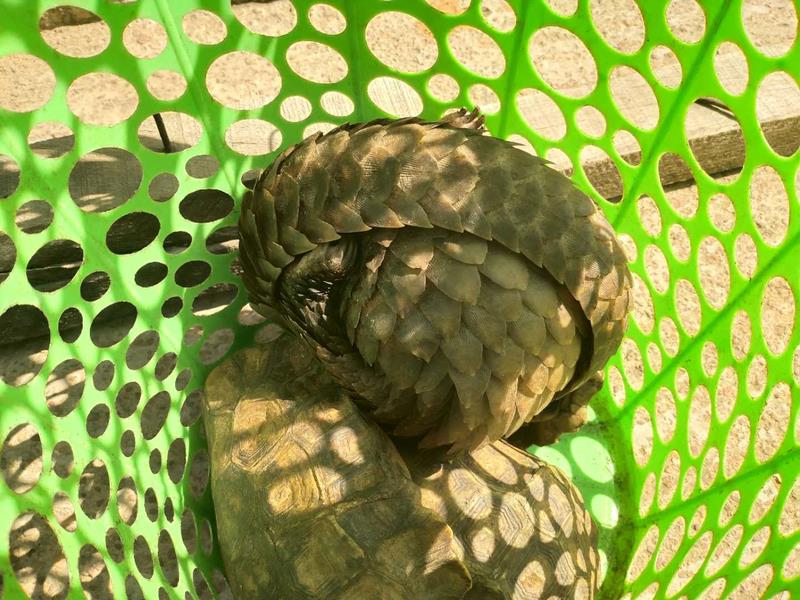
Pangolin sold in the local market.
Beijing News:What else do you sell in these two markets?
African chivalry:The "small fishing village" market is a market dominated by wild animals and fish, near the sea; The Moroccan market is a relatively complete market in the local area, selling vegetables, cigarettes, wine, tea and clothing.
Beijing News:What is the living standard of people who do business in the market in Nigeria?
African chivalry:It is relatively poor in the local area. On average, the higher average is five or six hundred yuan per person per month, and some people only have a salary of two or three hundred yuan.
Beijing News:Are these people who sell pangolins better off?
African chivalry:Obviously better, some local people can’t fill their stomachs, but these people who sell pangolins look better in clothes and phones than the local poor.
Beijing News:How did they learn Chinese?
African chivalry:Their Chinese is aimed at buyers, but it is not standard but can communicate.
Beijing News:Have you ever asked how long it takes to catch a pangolin?
African chivalry:I asked a local how many can I catch a month? He said that he can catch about ten a month, not every day, but one person can catch ten a month.
I only see Chinese people buying
Beijing News:Nigeria is eating pangolins. Only Chinese? Or are Chinese the main group?
African chivalry:All I see is Chinese buying. During the investigation in Africa, I only saw Chinese eating pangolins, but it did not rule out that people from other countries would buy them.
Beijing News:Do you know the main flow of pangolin smuggling?
African chivalry:As for smuggling, an insider revealed that the smuggling of pangolin scales is mainly by sea, and a large number of them are collected locally, and then transported to various countries, including China, by container sea.
Beijing News:What do the locals think of these pangolin-loving Chinese?
African chivalry:For these local people who catch and sell pangolins, they think that if you eat, I can make money. The local average salary is five or six hundred. If he catches a pangolin, his monthly income will come out.
Beijing News:What do you think is the most important thing to protect pangolin?
African chivalry:The most important thing is to publicize and tell the local Chinese that this is illegal. Many people don’t know that pangolins are also protected by law in Nigeria. They think that it is not illegal to eat pangolins in China.
Beijing News reporter Li Yukun
Editor Jia Wencheng proofreads Lu Aiying.
The pictures and videos in this article are provided by "African Xia"